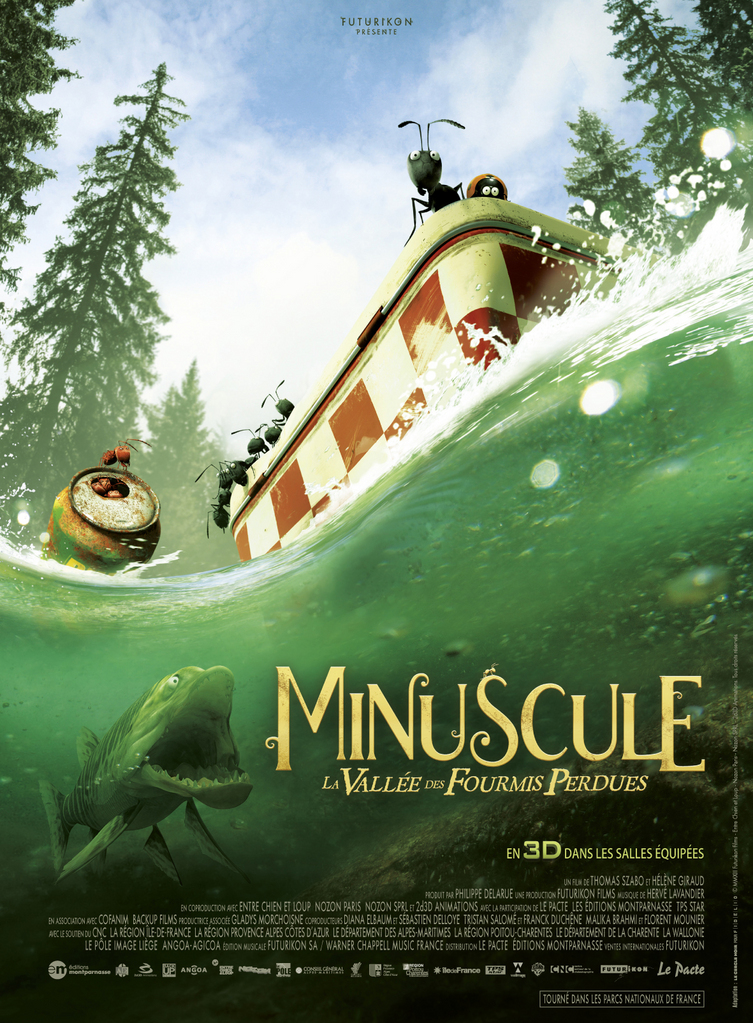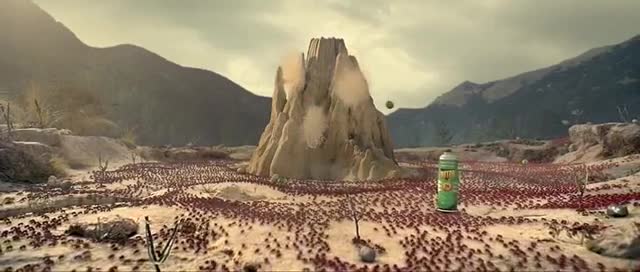 Tim here. Our journey through the list of films submitted for the Best Animated Feature Oscar now takes us to France and Belgium and the utterly beguiling children’s film Minuscule: Valley of the Lost Ants. Cumbersome title notwithstanding, it’s a light and breezy little lark, with a simple fairy tale-esque story so elemental in its particulars – an infant ladybug separated from her parents falls in with a colony of black ants and helps them in their war against aggressive red ants - that the movie can get away without having a single word of dialogue to be found anywhere in its running time.
Tim here. Our journey through the list of films submitted for the Best Animated Feature Oscar now takes us to France and Belgium and the utterly beguiling children’s film Minuscule: Valley of the Lost Ants. Cumbersome title notwithstanding, it’s a light and breezy little lark, with a simple fairy tale-esque story so elemental in its particulars – an infant ladybug separated from her parents falls in with a colony of black ants and helps them in their war against aggressive red ants - that the movie can get away without having a single word of dialogue to be found anywhere in its running time.
Writer-directors Thomas Szabo & Hélène Giraud have adapted the movie from their television series Minuscule (which I understand to be terrifically popular in places that aren’t the United States), made up of 6-minute comic shorts in which a variety of insects get into comic scrapes. Expanding from such a brief running time up to almost an hour and a half is not for the faint-hearted and Szabo & Giraud haven’t done it flawlessly: the film suffers some redundancy and stretched-out plot developments.
But at the same time, the filmmakers fully exploit the scope of a feature, both visually and in terms of story ambition. There are wide shots all throughout the whole length of the movie that present the ants’ valley as a series of endless vistas of woods and mountains, giving Minuscule the feel of a limitless universe of a sort that only shows up in the very best fantasies...

The climactic ant battle, mixing slapstick comedy with inventive ant-scale setpieces involving pinecones and matchbooks and all things in-between, has as much sweep and visual drama as any fantasy battle scene since the Lord of the Rings trilogy wrapped up in 2003.
The basic, familiar storytelling aside, what really makes Minuscule different is its style, a brazen reminder that even within the rulebook of Western feature animation, there are possibilities far beyond what American studios care to do. The character designs in this film are an almost indescribable mixture of realism and cartoon exaggeration: the bugs look like bugs in every respect, but for their bright, expressive Muppet-like googly eyes. It’s an unusual and highly idiosyncratic achievement in character design, but more importantly, it’s extraordinarily appealing: 2014 might not have produced an animated movie cast more enjoyable just to look at, and this being a visual medium and all, that counts for a lot.
The odd cartoon realism of the designs is so distinctive that it’s easy to lose track of the film’s even more impressive animation, which is its flawless and invisible blend of computer-generated and live-action backgrounds, behind the all-CGI characters. The combination of highly realistic settings and cartoon insects is already a little strange, and the flipping from CG to digital photography should be ruinous. While a few individual shots announce their computer-made nature a little too baldly (there’s a short underwater sequence in particular that just doesn’t work, more because of the lighting than anything else), there are many more images where it’s impossible to tell between cuts if we’re looking at live-action footage or not.

What matters about this all, though, is not that it’s an impressive demo reel: there are plenty of shorts that do much the same thing as this, just to show off that it can be done. The artistic and technical excellence of the film is important largely as a function of the inviting world-building that it allows. Minuscule takes place in a vivid, touchable series of environments that always promise a wide world just over the next hill and behind the next rock; it’s a movie where the realistic setting and the insects’ ability to interact with it makes it feel rich with possibilities for discovery and exploring. The movie is unflaggingly pleasant, in its enjoyable and involving images, its nice and never too aggressive comedy, its spectacular but harmless epic action. It is, frankly, a better children’s movie than anything from the American studios, live-action or otherwise, in 2014, and hopefully it gets some bit of exposure from popping up, however briefly, in the Oscar race; it absolutely deserves it. No matter how big it might go in some ways, the film is still driven by a tiny sweetness and friendly tone that makes it, always, a pleasant little yarn for kids, and that's what matters most.

Oscar chances: There’s no precedent for this sneaking in (The Secret of Kells has been the most low-profile film to swing a nomination in the category to date, and that was at least in English), but the animation branch might be swayed by its snazzy tech. I would absolutely not hold my breath.